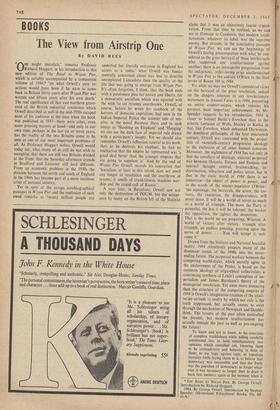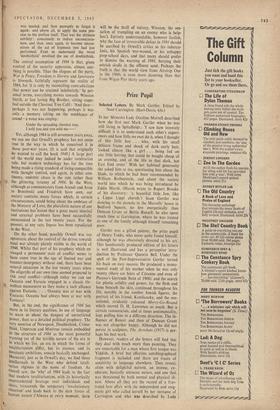BOOKS The View from Airstrip One
By DAVID REES
'NE might speculate,' remarks Professor O‘,./Richard Hoggart, in his introduction to this new edition of The Road to Wigan Pier, which is suitably accompanied by a companion volume of 1984,4' 'on what Orwell's own re- actions would have been if he were to come back to Britain thirty years after Wigan Pier was written and fifteen years after his own death.' The real significance of that vast northern grave- yard of the British industrial revolution which Orwell described so well in the mid-1930s escaped most of his audience at the time when the book was published in 1937—there were other, even more pressing matters at hand—and only in our own time, perhaps in the last six or seven years, has the reality of the two Britains come to be seen as one of our most important problems of all. As Professor Hoggart writes, Orwell would today see, what many of us still do not wish to recognise, that there are still two Britains divided at the Trent, that the Saturday afternoon crowds in Bradford and Leicester still look different. From an economic problem in the 1930s the division between the north and south of England in the 1960s has become part of a more insidious crisis of national identity.
Yet in spite of 'the savage autobiographical passages in Wigan Pier and the explosion of such awed remarks as 'twenty million people are underfed but literally everyone in- England has access to a radio,' what Orwell was funda- mentally concerned about was less to describe unemployed Lancashire than the quality of the life that was going to emerge from Wigan Pier. It's often forgotten, I think, that the book ends with a passionate plea for justice and liberty, for a democratic socialism which was equated with the wish `to see tyranny overthrown.' Orwell, of course, before he wrote his casebook of the horrors of domestic capitalism, had seen in the Indian Imperial Police the seamier side of em- pire; in the novel Burmese Days and in such essays as 'Shooting an Elephant' and 'Hanging' we can see the dark face of imperial rule drawn with a participant's insight. Yet we should also remember Orwell's reflection, central to his work, that, as he destroys his elephant, he had no realisation that the empire he represented was 'a good deal better than the younger empires that are going to supplant it.' And by the end of Wigan Pier Orwell records his conviction that `Socialism, at least in this island, does not smell any longer of revolution and the overthrow of tyrants; it smells of crankishness, machine wor- ship and the stupid cult of Russia.'
A year later, in Barcelona, Orwell saw not only the destruction of POUM, but the accept- ance by many on the British left of the Stalinist
claim that it was an objectively fascist organi- sation. From that time he realised, as we can see in Homage to Catalonia, that modern totali- tarianism, whatever its label, was the supreMe enemy. But already, in the concluding passages of Wigan Pier, we can see the beginnings of Orwell's lasting preoccupation with what he con- sidered as the great betrayal of those intellectuals who supported one totalitarianism against another; there is an inescapable progression from the indigenous, order-loving prigs anathematised in Wigan Pier to the sadistic O'Brien in ,the final terror of Room 101 in 1984.
Yet while we may see Orwell's considered views on the betrayal of the great revolution, indeed on the dangers inherent in any revolutionary movement in Animal Farm, it is 1984, presenting an entire counter-utopia, which remains his greatest, most important achievement. As Mr. Spender suggests in his introduction, 1984 is closer to Samuel Butler's Erewhon than to the eclectic fantasies of Wells, Huxley or Kafka in that, like Erewhon, which debunked Darwinism, the dominant philosophy of the later nineteenth century, Orwell was concerned with the projec- tion of twentieth-century progressive ideology to the exclusion of all other human concerns. Moreover, the nightmare of 1984 lies not only in that the corollary of ideology, external perpetual war between Oceania, Eurasia and Eastasia and internal thought control, brainwashing, in- doctrination, telescreen and police terror, but in that in the static world of 1984 there is no tomorrow—the object of power is power, and in the words of the master-inquisitor O'Brien: `the espionage; the betrayals, the arrest, the tor- tures, the execution, the disappearances, will never cease. It will be a world of terror as much as a world of triumph. The more the Party is powerful, the less it will be tolerant; the weaker the opposition, the tighter the despotism. . . . That is the world we are preparing, Winston. A world of victory after victory, triumph after triumph, an endless pressing, pressing upon the nerve of power You will accept it, wel- come it.'
Drawn from the Stalinist and National Socialist
reality, 1984 relentlessly projects many of the dominant trends of the 1940s into the never-
ending future. The perpetual warfare between the competing world-states, which secretly agree in the enslavement of the Proles, is based on the common ideology of oligarchical collectivism, a convincing synthesis of Lenin's conception of im- perialism and James Burnham's theory of the managerial revolution. Yet even more menacing than the structure of the competing empires of
1984 is Orwell's imaginative creation of the totali- tarian attitude to reality by which not only is the
truth suppressed, but actually ceases to exist through the mechanism of Newspeak and Double- think. The tyrants of the past often controlled the present, but modern totalitarianism has actually remade the past as well as pre-empting the future:
To know and not to know, to be conscious of complete truthfulness while telling carefully
constructed lies, to hold simultaneously two opinions which cancelled out, knowing them to be contradictory and believing in both of them; to use logic against logic, to repudiate
morality while laying claim to it, to believe that democracy was impossible and that the Party
was the guardian of democracy; to forget what- ever it was necessary to forget, then to draw it back into memory again at the moment when it
"THE ROAD TO WIGAN PIER. By George Orwell. Introduction by Richard Hoggart.
1984. By George Orwell. Introduction by Stephen Spender. (Heinemann Educational Books, 10s. 6d. ea v h 1
was needed, and then promptly to forget it again: and above all, to apply the same pro- cess to the probess itself. That was the ultimate subtlety: consciously to induce unconscious- ness, and then, once again, to become uncon- scious of the act of hypnosis you had just performed. Even to understand the word 'doublethink' involved the use of doublethink.
The central assumption of 1984 is that, given control of the security apparatus, almost any- thing is possible. Thus the slogans of the party, War is Peace, Freedom is Slavery and Ignorance is Strength,• faithfully represent the reality of 1984, for 'it is only by reconciling contradictions that power can be retained indefinitely.' In per- sonal terms, everything moves towards Winston Smith, at last loving Big Brother, sitting stupe- fied outside the Chestnut Tree Café: 'And then— perhaps it was not happening, perhaps it was only a memory taking on the semblance of sound—a voice was singing:
Under the spreading chestnut tree, I sold you and you sold me—'
Yet, although 1984 is still seventeen years away, we can see that Orwell's prophecy has not come true in the way in which he conceived it in those post-war years. (It is said that originally he wanted to call the book 1948.) A large part of the world may indeed be under totalitarian rule, but modern technology has for the time being made a rising standard of living compatible with thought control, and again, in other con- tinents, endemic chaos is the rule rather than the, glittering tyranny of 1984. In the West, although as commentators from Arendt and Aron to Brzezinski and Friedrich have seen, our society contains many forces which, in certain circumstances, could bring about the embrace of the Ministry of Love, the pluralistic nature of our institutions has meant that a great many internal and external problems have been successfully surmounted in the last twenty years. For the present, at any rate, Ingsoc has been repudiated in the West.
On the other hand, possibly Orwell was too optimistic about the control of the drives towards total war already plainly visible in the world of 1948. Whilst that part of his prophecy which en- visaged a permanent state of conflict seems to have come true in the age of limited war and counter-insurgency without end, there have been several occasions in the last twenty years when the oligarchs of our own time seemed prepared to risk total conflict—although today we can see Oceania and Eurasia engaged in a classic Or- wellian manoeuvre as they make a tacit alliance against Eastasia. . . . Oceania was at war with Eastasia; Oceania had always been at war with Eastasia I
But, in the end, the significance of 1984 lies more in its literary qualities, its use of language to warn us about the dangers of unrestricted Power, than as a detailed political prophecy. The very mention of Newspeak, Doublethink, Crime- think, Unperson and Minitrue remain embedded in the structure of 1984 as the most powerful warning yet of the terrible nature of the era in in which we live, an era in which the forms of totalitarianism differ, but its essence, and its messianic ambitions, remain basically unchanged. Moreover, just as in Orwell's day, we find those intellectuals in the West who defend totali- tarian regimes in the name of freedom. As Orwell saw, the 'why' of 1984 leads to the fact that modern totalitarianism, with its historically unprecedented leverage over individuals and ideas, transcends the temporary 'revolutionary situation' and leads back to the dark forces of human nature ('Always at every moment, there will be the thrill of victory, Winston, the sen- sation of trampling on an enemy who is help- less'). Entirely understandable, however foolish, why the face of irreversible defeat in 1984 should be ascribed by Orwell's critics to his tubercu- losis, his Spanish war-wound, or his unhappy prep-school days, and that many should prefer to dismiss the warning of 1984, burying their ostrich skulls in the affluent sand. Perhaps the truth is that the world view from Airstrip, One in the 1960s is even more daunting than that from Wigan Pier thirty years ago.







































 Previous page
Previous page